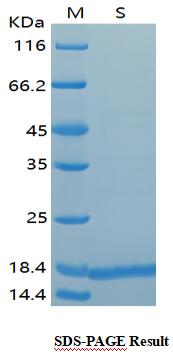Product Name :
CD152 Recombinant Protein Swiss-Prot :
P16410 Host :
E.coli Tag :
≥0.5mg/ml Amino acid Sequence :
KAMHVAQPAVVLASSRGIASFVCEYASPGKATEVRVTVLRQADSQVTEVCAATYMMGNELTFLDDSICTGTSSGNQVNLTIQGLRAMDTGLYICKVELMYPPPYYLGIGNGTQIYVIDPEPCPDSD Restriction sites :
NdeI-XhoI Background :
Cytotoxic T-lymphocyte protein 4 (CTLA-4, CD152) is an Ig superfamily member that negatively regulates early T cell activation. The CTLA-4 protein is primarily expressed on T cells, including CD8+ cytotoxic T cells, CD4+ helper T cells, and CD4+/FoxP3+ regulatory T cells. CTLA-4 protein competes with CD28 for B7.1 (CD80) and B7.2 (CD86) binding at the cell surface, which results in the down regulation of T cell activity. The activation of SHP-2 and PP2A downstream of CTLA-4 attenuates TCR signaling. Research studies indicate that CTLA4 knockout mice display lymphoproliferative disorders leading to early death, confirming the role of CTLA-4 as a negative regulator of T cells. Mutations in the corresponding CTLA4 gene are associated with multiple disorders, including insulin-dependent diabetes mellitus, Graves disease, Hashimoto thyroiditis, celiac disease, systemic lupus erythematosus, and type V autoimmune lymphoproliferative syndrome. Additional studies demonstrate that CTLA-4 blockade is an effective strategy for tumor immunotherapy. Soluble :
PBS, 4M Urea, PH7.4 Purification&Purity :
Transferred into competent cells and the supernatant was purified by NI column affinity chromatography and the purity is > 85% (by SDS-PAGE). Storage&Stability :
Store at 4°C short term. Aliquot and store at -20°C long term. Avoid freeze-thaw cycles. Expression vector :
pet-22b(+) BiowMW :
~14kDa Note :
For research use only, not for use in diagnostic procedure. concentration :
≥0.5mg/ml
CD152 Recombinant Protein Swiss-Prot :
P16410 Host :
E.coli Tag :
≥0.5mg/ml Amino acid Sequence :
KAMHVAQPAVVLASSRGIASFVCEYASPGKATEVRVTVLRQADSQVTEVCAATYMMGNELTFLDDSICTGTSSGNQVNLTIQGLRAMDTGLYICKVELMYPPPYYLGIGNGTQIYVIDPEPCPDSD Restriction sites :
NdeI-XhoI Background :
Cytotoxic T-lymphocyte protein 4 (CTLA-4, CD152) is an Ig superfamily member that negatively regulates early T cell activation. The CTLA-4 protein is primarily expressed on T cells, including CD8+ cytotoxic T cells, CD4+ helper T cells, and CD4+/FoxP3+ regulatory T cells. CTLA-4 protein competes with CD28 for B7.1 (CD80) and B7.2 (CD86) binding at the cell surface, which results in the down regulation of T cell activity. The activation of SHP-2 and PP2A downstream of CTLA-4 attenuates TCR signaling. Research studies indicate that CTLA4 knockout mice display lymphoproliferative disorders leading to early death, confirming the role of CTLA-4 as a negative regulator of T cells. Mutations in the corresponding CTLA4 gene are associated with multiple disorders, including insulin-dependent diabetes mellitus, Graves disease, Hashimoto thyroiditis, celiac disease, systemic lupus erythematosus, and type V autoimmune lymphoproliferative syndrome. Additional studies demonstrate that CTLA-4 blockade is an effective strategy for tumor immunotherapy. Soluble :
PBS, 4M Urea, PH7.4 Purification&Purity :
Transferred into competent cells and the supernatant was purified by NI column affinity chromatography and the purity is > 85% (by SDS-PAGE). Storage&Stability :
Store at 4°C short term. Aliquot and store at -20°C long term. Avoid freeze-thaw cycles. Expression vector :
pet-22b(+) BiowMW :
~14kDa Note :
For research use only, not for use in diagnostic procedure. concentration :
≥0.5mg/ml
Blocking peptide available as NCP0272P

 CD152 Recombinant Protein
CD152 Recombinant Protein 
 Datasheet
Datasheet COA
COA MSDS
MSDS SHIP
SHIP